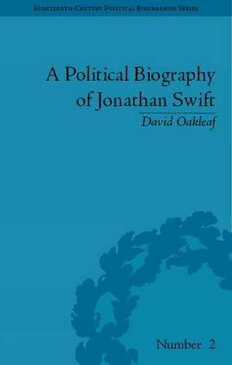
A Political Biography of Jonathan Swift (Eighteenth-Century Political Biographies) PDF
277 Pages·2008·1.224 MB·English
Most books are stored in the elastic cloud where traffic is expensive. For this reason, we have a limit on daily download.
Preview A Political Biography of Jonathan Swift (Eighteenth-Century Political Biographies)
Description:
Now most famous as the author of "Gulliver's Travels", Jonathan Swift (1667-1745) was one of the most important propagandists and satirists of his day. Modern readers have difficulty placing him on the political spectrum. He rejected political parties as factions but supported the Whigs and then the Tories. He defended the exclusive privileges of (Anglican) Church of Ireland, yet he was an eloquent champion of liberty. Insisting he was English, he became a celebrated Anglo-Irish patriot. This study seeks to contextualize Swift within the political arena of his day.Swift's politics reveal two profound influences. War and his Irish upbringing shaped the High Church but pro-Revolution political stance that gave him points of contact with both Tories and Whigs without identifying him with either. Struggling to define himself politically without compromising his independence, Swift expressed passions more extravagant than his positions. Usually angered by a human situation rather than animated by an ideology, he invented memorable voices under the pressure of events. They reveal as much about his developing relationship to the political fray as his particular statements about the Church, the Glorious Revolution, or Ireland. That is why Swift's politics still command our attention.
See more
The list of books you might like
Most books are stored in the elastic cloud where traffic is expensive. For this reason, we have a limit on daily download.
